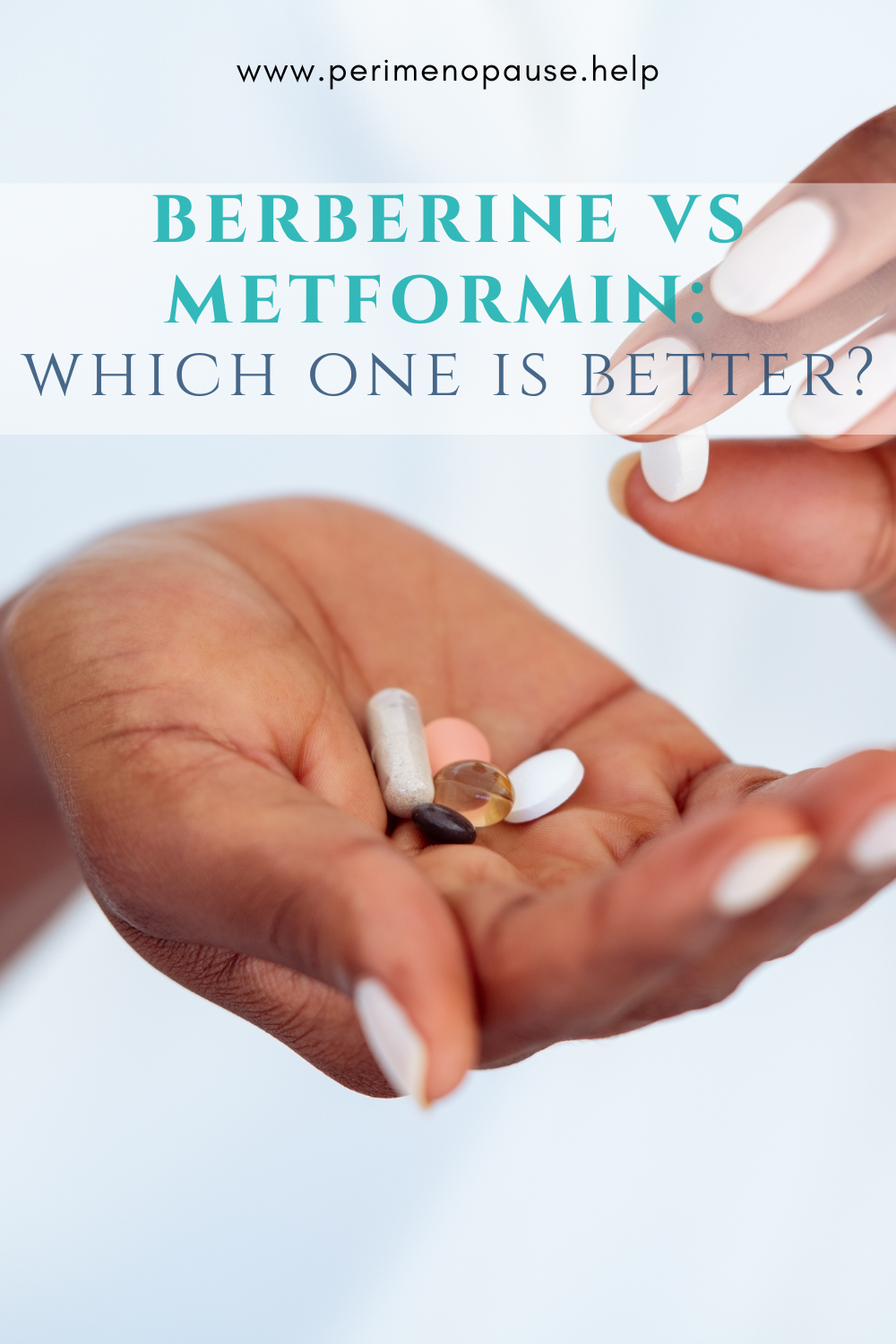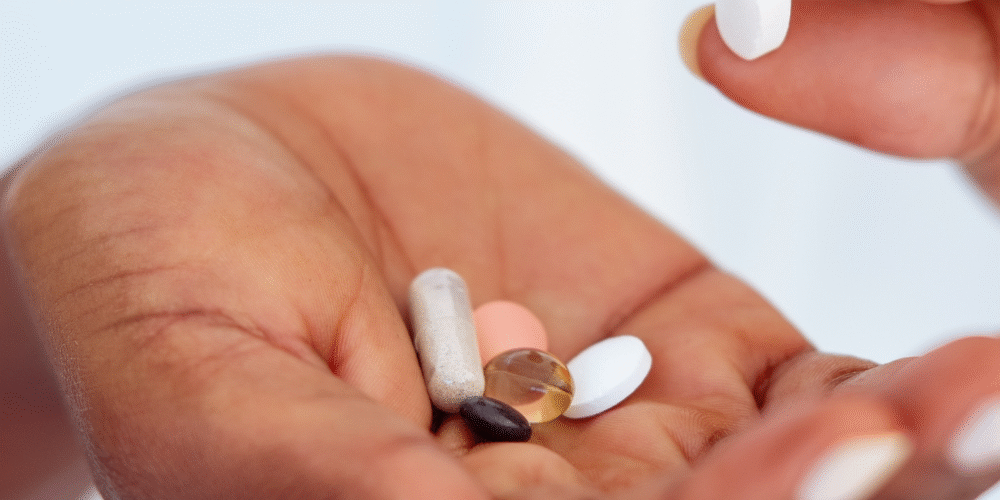Struggling with weight gain or insulin resistance during perimenopause or menopause? Discover how berberine vs metformin stack up—and which one could work best for your metabolism and hormones.

Both berberine and metformin play powerful roles in improving insulin sensitivity and metabolism—but understanding their differences is key to choosing the right approach for your unique hormonal stage. This blog walks you through their differences, similarities and highlights who may benefit most from berberine vs metformin.
Key Takeaways
- Metformin is an FDA-approved prescription medication for managing Type 2 diabetes.
- Berberine is a natural supplement that has been used successfully in blood sugar regulation, insulin resistant and lipid management, and has even helped weight and hormone balance in perimenopause.
- Both metformin and berberine activate AMPK, contributing to their effectiveness in lowering blood sugar levels.
- Berberine may provide additional benefits for gut health and cholesterol management compared to metformin.
- There is increasing interest in berberine as a natural alternative to traditional diabetes medications due to its favorable safety profile.
So let’s dive into these two powerful tools for insulin resistance, and explore their other potential benefits and uses, as well as side effects and research.
1. What is Insulin Resistance?
Insulin resistance occurs when your cells don’t respond properly to insulin, making it harder for glucose to enter cells. When glucose stays in the cells this can lead to prediabetes, diabetes, increased belly fat, and increased risk for heart disease.
This condition is particularly common during perimenopause and menopause, when hormonal fluctuations can significantly impact metabolic health.
For women in their 40s and beyond, insulin resistance can contribute to frustrating weight gain and difficulty losing weight. As estrogen levels sky rocket and then decline, the body’s ability to regulate blood sugar becomes compromised, creating a perfect storm for metabolic challenges.
2. Metformin, insulin resistance, and metabolism
Metformin is a well-established prescription medication most commonly used to manage Type 2 diabetes and insulin resistance. Originally derived from the French lilac plant, it has been FDA-approved since the 1990s and remains one of the most studied and trusted metabolic support medications available. Metformin works primarily by reducing the amount of glucose produced by the liver and improving how the body uses insulin, making it a powerful tool for regulating blood sugar and preventing long-term metabolic complications.
Beyond its role in blood sugar control, metformin offers several secondary benefits that can make it helpful during perimenopause and menopause. Studies suggest that metformin may modestly support weight management, help reduce visceral fat, and improve lipid profiles, all of which are common concerns as estrogen levels decline and insulin resistance increases. It has also been shown to have some potential anti-inflammatory and anti-aging properties, possibly due to its impact on mitochondrial function and oxidative stress.
For women with polycystic ovary syndrome (PCOS) or other insulin-related hormonal imbalances, metformin can also play a role in improving ovulatory function and lowering elevated androgen levels. During perimenopause, it may help stabilize blood sugar fluctuations that contribute to fatigue, mood swings, and weight gain. While metformin is generally well tolerated, some people experience mild digestive side effects such as nausea or diarrhea, which often improve when the dose is increased gradually or taken with food. In rare cases it can also lead to lactic acidosis occurring primarily in people with significant kidney, liver, or heart disease, and resulting from the buildup of lactic acid when the body can’t clear it efficiently.
3. Berberine in insulin resistance, metabolism, and hormone balance
Berberine is a naturally occurring bioactive compound found in plants such as barberry, goldenseal, and Oregon grape. This bright yellow alkaloid has been used in Traditional Chinese Medicine for thousands of years to support digestion, liver function, and overall metabolic balance. In recent years, it has gained attention in modern functional medicine circles for its ability to help regulate blood sugar, improve insulin sensitivity, and support weight management—earning it the nickname “nature’s Ozempic.”
For women who are in perimenopause and menopause, berberine offers a non-prescription option that may not only assist with blood sugar and metabolism but also benefit other areas of health. Research suggests berberine can improve cholesterol levels, reduce triglycerides, and support a healthier gut microbiome—an important factor in inflammation control and estrogen metabolism. Some studies also show that berberine helps stabilize appetite and energy, which can further aid in managing menopause-related weight gain. While it doesn’t work for everyone—particularly if weight gain is primarily driven by hormonal rather than metabolic changes—berberine’s combined effects on glucose regulation, gut health, and inflammation make it a promising natural support for women navigating hormonal transitions.
4. How Metformin Works
Metformin operates through several mechanisms to improve glucose metabolism.
The key to metformin’s effectiveness lies in its ability to activate AMP-activated protein kinase (AMPK)—the same energy-sensing enzyme influenced by berberine. By activating AMPK, metformin enhances glucose uptake in muscle cells, reduces hepatic glucose production, and improves insulin sensitivity throughout the body. This results in lower fasting blood glucose levels and improved metabolic flexibility without causing hypoglycemia, which is one of the reasons it’s considered a cornerstone therapy for metabolic health.
By activating AMPK, metformin: – Reduces hepatic glucose production in the liver – Increases glucose uptake in muscle tissues – Delays intestinal absorption of glucose – Improves insulin signaling, enhancing insulin sensitivity
These actions collectively lower blood glucose levels without causing hypoglycemia (blood sugar to go too low).
5. How Berberine Works
Surprisingly, berberine works through mechanisms strikingly similar to metformin. Research indicates that berberine also activates AMP-activated protein kinase, which explains why many consider it a natural alternative, and quite similar to metformin. This makes berberine especially useful for individuals with insulin resistance, metabolic syndrome, or blood sugar instability, all of which can become more common during perimenopause and menopause as estrogen levels decline.
Berberine’s actions include: – Decreasing insulin resistance at the cellular level – Reducing glucose production in the liver – Slowing carbohydrate breakdown in the gut – Increasing the number of beneficial gut bacteria – Enhancing lipid metabolism
These effects make berberine particularly interesting for addressing the menopause metabolism changes that contribute to weight gain and insulin resistance.
6. How Berberine vs Metformin can each affect blood sugar, metabolism, and more
When comparing berberine vs metformin for blood sugar management, clinical studies show surprisingly similar effects and efficacy. A systematic review of 14 randomized trials found that berberine was as effective as metformin in reducing HbA1c levels and fasting blood glucose.
For women with insulin resistance during perimenopause and menopause, both options demonstrate significant benefits. A key study published in Metabolism showed that berberine reduced HbA1c by 0.9% compared to metformin’s 1.1%, a difference not considered statistically significant Source.
This suggests that for many women, berberine could be a viable alternative when metformin isn’t tolerated or preferred. Read on to learn more about this!
7. Additional Benefits of Metformin
Beyond blood sugar control, metformin offers several additional benefits that may be particularly valuable for women dealing with metabolic challenges. Research indicates potential protective effects against certain cancers and possible anti-aging properties.
For women with polycystic ovary syndrome (PCOS), metformin can help regulate menstrual cycles and reduce testosterone levels. It may also improve fertility in some cases by addressing the underlying insulin resistance that often drives PCOS symptoms Source.
Benefits in Perimenopause and Menopause
Metformin offers specific advantages during perimenopause and menopause:
– May counteract perimenopause weight gain by improving metabolic function
– Could help prevent the increased risk of diabetes that comes with menopause
– Might reduce hot flashes according to some preliminary research
– May help maintain muscle mass while promoting fat loss
– Could potentially slow the acceleration of cardiovascular risk factors
8. Additional Benefits of Berberine
Berberine offers a broader spectrum of health benefits beyond glucose control, and some extras that metformin doesn’t offer, which may make it particularly appealing for women seeking comprehensive support. Its anti-inflammatory and antimicrobial properties contribute to its wide-ranging effects.
Research shows berberine may outperform metformin in certain areas, particularly in improving lipid profiles. Studies indicate berberine can reduce total cholesterol by about 24 mg/dL and LDL cholesterol by about 25 mg/dL, effects not typically seen with metformin.
Benefits in Perimenopause and Menopause
For women navigating perimenopause and menopause, berberine offers several advantages:
– May specifically target menopause weight gain by improving fat metabolism
– Supports gut health, which often declines during hormonal shifts
– Reduces chronic inflammation associated with menopausal changes
– Improves lipid levels, addressing the increased cardiovascular risk after menopause
– May help with mood regulation through its impact on gut-brain connections
– Has also been linked to anti-cancer properties, like metformin
9. Safety and Side Effects of Metformin
Metformin has a well-established safety profile with decades of clinical use. However, it’s not without common side effects, which primarily affect the digestive system.
The most frequently reported side effects include:
– Gastrointestinal issues (nausea, diarrhea, abdominal discomfort)
– Metallic taste in the mouth
– Vitamin B12 deficiency with long-term use
– Lactic acidosis (rare but serious)
The digestive side effects typically improve with time or by taking the medication with meals. Starting with a low dose and gradually increasing can also help minimize these effects. The extended-release version taken at night can also counteract this.
While lactic acidosis is often mentioned as a risk, it’s extremely rare in patients without severe kidney or liver disease.
10. Safety and Side Effects of Berberine
Berberine supplements generally demonstrate good tolerability, though they aren’t without potential side effects. As with metformin, digestive issues are the most common complaints.
Typical side effects include:
– Gastrointestinal discomfort (constipation, diarrhea, gas)
– Possible interaction with certain medications
Potential for reduced absorption of other supplements or medications
– Not recommended during pregnancy
A key advantage of berberine is the absence of lactic acidosis risk, making it potentially safer for individuals with kidney concerns. When looking for a brand of berberine it’s best to look for one that has third party studies to confirm its standardization. Two brands I recommend and use often are:
No products found.
- Supports Gastrointestinal Function & Cellular Energy Metabolism: Berberine supports healthy lipid metabolism and carbohydrate metabolism; this science-backed wellness supplement is easy to integrate into your daily wellness habits*
- Metabolic Support Supplement*: Supports healthy carbohydrate metabolism and cellular energy metabolism*
- Metabolic Support*: Berberine supports healthy lipid metabolism and cholesterol homeostasis*
- Berberine Dietary Supplement: Berberine does not contain wheat, gluten, corn, soy, dairy, or artificial colors or flavors
- About Integrative Therapeutics: For over 25 years, patients and clinicians have trusted us for our dedication to quality, potency, and accuracy; transparency around our sourcing and manufacturing processes is part of our quality promise to you
11. What does the evidence say on Berberine vs Metformin
Metformin holds an unquestionable standing in conventional medicine as the gold standard for managing Type 2 diabetes (though glp-1 medications, when covered, are gaining ground)—supported by decades of research, FDA approval, and inclusion in every major treatment guideline.
Berberine, on the other hand, has deep roots in natural and traditional medicine. Extracted from plants such as barberry, goldenseal, and Oregon grape, it has been used successfully for centuries in Chinese and Ayurvedic medicine for metabolic, digestive, and inflammatory conditions. Integrative, Functional and Naturopathic providers have also used this herb for decades. Modern research has begun to validate many of these historical uses, showing that berberine can improve insulin sensitivity, reduce blood sugar, lower cholesterol, and support weight management through mechanisms similar to metformin—particularly by activating the AMPK pathway.
While it hasn’t undergone the same FDA approval process as pharmaceutical drugs, berberine’s growing body of peer-reviewed evidence and long-standing safety record have made it increasingly popular among functional and integrative practitioners. Even institutions such as the Cleveland Clinic acknowledge its potential benefits, while still emphasizing the importance of individualized care and medical supervision when adding any supplement.
Conclusion
When comparing berberine vs metformin for insulin resistance during perimenopause and menopause, both options demonstrate significant merit. Metformin offers the advantage of extensive research, medical oversight, insurance coverage, and established protocols. Berberine provides a natural alternative with comparable glucose-lowering effects plus additional benefits for lipid management and gut health.
The decision between these options should consider individual factors including:
– Severity of insulin resistance
– Presence of other medical conditions (berberine is safer for those who have kidney disease and can help if you have gut issues and high cholesterol, while metformin has more evidence in PCOS)
– Tolerance to side effects (though both can have GI side effects)
– Access to medical supervision
– Personal preference regarding natural versus pharmaceutical approaches.
Ultimately, neither option stands alone as a magic solution. The most effective approach combines either metformin or berberine with fundamental lifestyle changes, including whole foods nutrition, regular exercise, stress management, and adequate sleep. These foundations remain essential for addressing the root causes of metabolic disruption during hormone shifts.
For more help with these steps, check out these posts:
7 Reasons You’re Gaining Weight During Perimenopause (And How to Get Back on Track)
How to Boost Menopause Metabolism: Adapt, Don’t Settle
Always consult with your healthcare provider before starting any new supplement or medication regimen, especially when managing conditions like insulin resistance, which require careful monitoring.
Ready to take control of your metabolic health during perimenopause and menopause? Download our free guide to managing insulin resistance naturally and discover practical strategies you can implement today!
Found this information helpful? Share this article on social media to help other women navigate similar challenges during perimenopause and menopause.

Dr. Shelley Meyer is a board-certified family physician and Institute of Functional Medicine-certified functional medicine physician, as well as a Registered Dietitian. She is passionate about helping women navigate the roller coaster of perimenopause and postmenopause. She has her own Functional Medicine Practice in Denver, Colorado.






Leave a Reply
You must be logged in to post a comment.